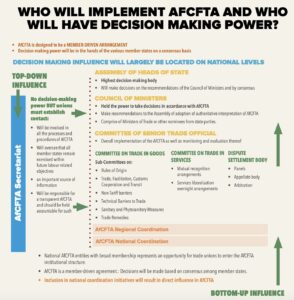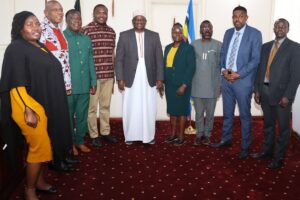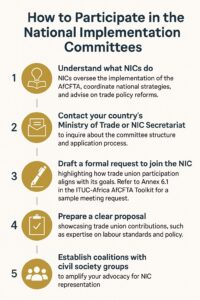The ITUC-Africa AfCFTA toolkit provides step-by-step guides, advocacy templates, and strategic insights to help unions engage with the African Continental Free Trade Area (AfCFTA). This article highlights opportunities for trade union involvement in AfCFTA National Implementation Committees (NICs), which serve as a key entry point for embedding workers’ voices and priorities in the continental free trade agreement.
Trade unions understand the possibilities of the African Continental Free Trade Area (AfCFTA). But we also know that possibility alone does not deliver trade justice. Workers face real risks under the AfCFTA, from potential job losses in vulnerable sectors to the continued exclusion of informal workers. Gender-sensitive policies remain inadequate, and many countries still struggle with weak infrastructure, unstable political environments, and fragmented regulations. Without strong protections, trade liberalisation could undermine labour standards rather than lift them.
Trade justice requires strategic, organised engagement through formal social dialogue mechanisms. ITUC-Africa and its affiliates demand such mechanisms to promote an inclusive and sustainable AfCFTA in every member country. The demand stems from two notions: first, that two-thirds of negotiations happen at the country level, where those most affected by policy can shape its direction; and second, that effective union advocacy and knowledge-building must be anchored in the local context, and understanding of local issues and influential players.
AfCFTA’s National Implementation Committees (NICs) are the strategic entry point for unions campaigning to embed workers’ voices and priorities at the heart of implementation.
 Source: LRS, 2021, Trade Unions and Trade: A Guide to the AfCFTA
Source: LRS, 2021, Trade Unions and Trade: A Guide to the AfCFTA
What are National Implementation Committees?
The NICs were established by a 2018 decision of the African Union Assembly to facilitate effective and coordinated implementation of AfCFTA at national and regional levels. At least 19 countries have established NICs, including Namibia, Ghana, Nigeria, Tunisia, Kenya, Côte d’Ivoire, and Rwanda.
The responsibilities of NICs
- Oversee the implementation of the AfCFTA Agreement and national and regional strategies.
- Mainstream gender and youth considerations in strategy implementation.
- Support the formulation of country positions in trade negotiations.
- Manage risks associated with strategy implementation.
- Develop work plans, budgets, and periodic reports.
- Raise awareness and collaborate with all stakeholders.
- Monitoring and evaluating policies and projects supporting AfCFTA implementation.
- Advising and lobbying the government on policy reform and domesticating AfCFTA instruments and complementary instruments in line with existing structures to implement trade and development policy.
NICs must include diverse stakeholders, including government ministries, departments and agencies, business, academia, civil society, and trade unions. Line ministries or designated Secretariats drive the technical work of NICs, supported by working groups that oversee the implementation of national and regional AfCFTA strategies.
“Implementation on the ground is the key to delivering on the expectations of the AfCFTA… This requires national AfCFTA entities to be created with broad membership that reflects the wide range of stakeholders and interests.”
– Luke, D. 2020. Implementing the African Continental Free Trade Area during the 2020s. IN: The Futures Report Making the AfCFTA Work for Women and Youth.
Opportunities for trade Union involvement in AfCFTA NICs
STEP 1: Understand what NICs do. Trade unions must be included in the NICs of all countries as part of the binding treaty. Unions can strengthen the case for labour provisions and the decent work agenda through coalitions with civil society organisations. For example, the African Trade Union Network for Economic Transformation (ATUNET) and the Africa Trade Network (ATN), a coalition of civil society and activists working on trade and finance issues.
STEP 2: Apply to join the NIC. Contact the trade ministry or NIC Secretariat to inquire about the committee structure and application process. Successful examples to emulate include:
- Trade Union Congress of Namibia (TUCNA) was granted membership to their country’s NIC in 2024.
- Central Organisation of Trade Unions (COTU-Kenya) secured a commitment from the trade cabinet secretary to include unions in the NIC in 2024.
- CESTRAR (Rwanda Workers’ Trade Union Confederation) received an invitation from the trade ministry to join the AfCFTA national steering committee in 2023.
- Ghana Trades Union Congress is integral to the NIC.
- Nigeria Labour Congress has a seat at the NIC.
STEP 3: Understand the AfCFTA implementation review. The AfCFTA Implementation Review Mechanism (AfIRM) establishes structures, processes, and procedures for tracking, evaluating, and sharing the progress and outcomes of AfCFTA implementation. Unions should form key stakeholders in the annual AFIRM at the national and regional levels. Views on how the AfCFTA is responding to labour rights must be reflected in country self-assessment reports, Secretariat compliance assessment reports, Annual Secretary General’s compliance assessment report, follow-up action plans and dedicated sessions of the senior trade officials.
STEP 4: Engage policymakers and governments. Build formal and consistent communication with key government ministries responsible for trade, labour, and economic development. Regular meetings, policy briefs, and position papers help unions craft substantiated representation demands. For example, In Uganda unions can engage the Ministry of Trade through the National Trade Sector Advisory Council, which shapes national trade priorities and commissions studies on implementing trade policies at different levels. At the regional level, they can lobby for seats in bodies like the EAC Sectoral Council on Trade, Industry, Finance and Investment, which guides the integration agenda in the sectors. Unions in South Africa participate in trade through The National Economic Development and Labour Council (NEDLAC), the statutory social dialogue platform. NEDLAC, prodded by unions, recently commissioned a research study on the inclusion of social clauses in South Africa’s trade agreements.
STEP 5: Use your seat effectively. Advocate for worker-friendly policies that support AfCFTA implementation, strengthen social dialogue, and contribute to monitoring progress while holding governments accountable for delivering labour-related commitments. Additionally, unions can facilitate skills development and training programmes to prepare workers for emerging opportunities in AfCFTA’s expanded markets.
CAMPAIGN INFOGRAPHIC: Five trade union demands for the AfCFTA
Inspiring NIC inclusion victories
In 2024, union advocacy resulted in two significant victories in Namibia and Kenya. These victories show the growing influence of unions in shaping the development of the AfCFTA.
Namibia
 ITUC-Africa delegation, TUCNA team and Ministry of Industrialisation and Trade officials | November 2024, Windhoek
ITUC-Africa delegation, TUCNA team and Ministry of Industrialisation and Trade officials | November 2024, Windhoek
The Trade Union Congress of Namibia (TUCNA) secured inclusion in the Namibia AfCFTA NIC in November. The Trade Union Congress of Namibia (TUCNA) secured inclusion in the Namibia AfCFTA NIC in November. TUCNA’s initial discussions with ministry officials highlighted a gap in understanding the comprehensive mandate of unions and labour provisions in trade agreements. The willingness to learn by officials helped TUCNA to advocate effectively, with ITUC-Africa and the Labour Research Service providing key support. TUCNA leveraged evidence from a study on the AfCFTA’s impact on Namibia’s workforce to strengthen its advocacy. TUCNA also secured a seat at the Namibia Trade Forum and plans to empower affiliates to engage in and participate in sectoral trade forums.
“Do not assume stakeholders know what you do. Begin with the basics and educate them until they understand who you are and why they should listen. This approach has been effective with the Ministry of Trade, the Bank of Namibia, and the Ministry of Finance. Now that the door is open, we must prepare to use the opportunity to influence.”
– Mahongora Kavihuha, General Secretary of TUCNA.
Kenya
 ITUC-Africa delegation, TUCNA team and Ministry of Investments, Trade Industry officials | November 2024, Nairobi
ITUC-Africa delegation, TUCNA team and Ministry of Investments, Trade Industry officials | November 2024, Nairobi
The Central Organisation of Trade Unions (COTU-Kenya) secured a commitment from the Cabinet Secretary for Trade, Investment and Industry in November 2024 to include unions in their AfCFTA NIC.
COTU-Kenya leveraged prior experience negotiating international trade agreements, including the EU Economic Partnership Agreement and AGOA. COTU-Kenya continues to develop trade expertise and build cross-border solidarity for influence.
“Trade is about capital and labour. We cannot truly achieve inclusive growth if workers are left behind. The Women and Youth Protocol is a welcome signal that no one should be excluded. But to ensure women in trade can thrive, we need more than aspirational language; we demand gender mainstreaming and actionable commitments.”
– Rose Omamo, COTU-Kenya Board Member and Deputy President of ITUC-Africa.
ESSENTIAL RESOURCE: The Toolkit for Trade Union Engagement in the African Continental Free Trade Area (AfCFTA) – Practical Steps for Unions on Trade Facilitation, the Promotion of Labour Provisions, and Inclusive Participation in the AfCFТА.
“The ITUC-Africa AfCFTA toolkit serves as a practical resource for national centres, regional federations, Global Union Federations, and global trade unions. We must seize this moment to demand equitable trade, strong labour provisions, and inclusive growth policies. Let us work together for trade policies that ensure social justice, dignity, and fairness for all workers.”
– Joel Akhator Odigie, General Secretary of ITUC-Africa.
 Source: ALREI, 2025, The Toolkit for Trade Union Engagement in the African Continental Free Trade Area (AfCFTA)
Source: ALREI, 2025, The Toolkit for Trade Union Engagement in the African Continental Free Trade Area (AfCFTA)
ESSENTIAL RESOURCES
- Trade, Employment and Trade Unions in Africa: Some Policy Options
- Trade Union Informal Cross Border Trade (ICBT) Advocacy in Africa
- An Impact Analysis of the African Continental Free Trade Area (AfCFTA) in its Post-Implementation Phase (2021-2025): A Trade Union Lens
- A Guide to the AfCFTA Protocol on Trade in Services
- Kenya Trade Fact Sheet
- Namibia Trade Fact Sheet
Nelly Nyagah
Nelly Nyagah is the Head of Communications at Labour Research Service.


 ITUC-Africa delegation, TUCNA team and Ministry of Industrialisation and Trade officials | November 2024, Windhoek
ITUC-Africa delegation, TUCNA team and Ministry of Industrialisation and Trade officials | November 2024, Windhoek ITUC-Africa delegation, TUCNA team and Ministry of Investments, Trade Industry officials | November 2024, Nairobi
ITUC-Africa delegation, TUCNA team and Ministry of Investments, Trade Industry officials | November 2024, Nairobi Source: ALREI, 2025,
Source: ALREI, 2025,